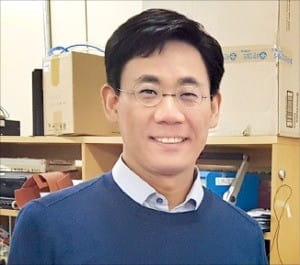Department News
Prof. Sung-Hoon Ahn, [The Korea Economic Daily] “Low Cost, Maximum Efficiency Smart Factories for Small-scale Businesses”
“Low Cost, Maximum Efficiency Smart Factories for Small-scale Businesses,” says Prof. Sung-Hoon Ahn<?xml:namespace prefix = "o" ns = "urn:schemas-microsoft-com:office:office" />

Prof. Sung-Hoon Ahn, Project Leader of SNU & RWTH Aachen University Joint Research on Smart Factories
‘Optimization technology’ incorporated with smart factories
‘Smart meter’ clothing factory developed in Indonesia
"Essential technology for small-scale businesses with lower budget…
Customized government support is necessary, in alliance with characteristics of each company"
“Even small-scale businesses can survive the competition with large international companies by implementing ‘optimal smart factory,’ which aims for maximum efficiency at a lower cost.”
On October 14th, Professor Sung-Hoon Ahn of Seoul National University’s Dept. of Mechanical and Aerospace Engineering (Photo) commented as above, adding to his announcement that “[we] will be developing ‘optimal smart factory’ technology in cooperation with Germany’s RWTH Aachen University.” He serves as the project leader of SNU & RWTH Aachen University Joint Research on Smart Factories, launced on October 2nd.
Prof. Ahn is well-known for combining smart factory research with optimization technology. Optimization technology focuses on how a technology can be developed in accordance with the environmental, economic, and social conditions of a certain region. This technology costs less and is relatively easy to learn. “Using low-cost hardware and software, we can expect it to perform up to 70% of a large company’s smart factory,” he commented. “Optimal smart factory is essential for small-scale businesses who cannot afford to invest a large amount of money.”
Prof. Ahn’s idea of optimal smart factories are being tried out in Indonesia. In July 2017, SNU signed ‘Memorandum of Understanding for Industry-Academia Cooperation’ with Hojeon Limited, in order to implement smart factories in their clothing factories in Indonesia. He focused on the smart meter, an electronic meter that measures electricity use periodically and communicate the information.
He explained that “by attaching a smart meter on manufacturing equipment such as sewing machines and sending the information on electricity use, we can monitor the status of equipment and production in real-time,” adding that “based on this data, we can find ways to increase efficiency, such as realigning production lines.”
Prof. Ahn experienced the effectiveness of smart meters in Mkalama, Tanzania, where a 10kW solar power plant was installed at the village. “We monitored the energy use per household and energy production of the power plant using smart meters,” he said. “We were able to manage the system more efficiently by controlling the energy use and energy production.”
Last May, Prof. Ahn and his team visited Indonesia with smart meters created in their own lab. “We are planning to install smart meters on more than 1000 sewing machines, expanding to all five factories in Indonesia by early next year,” he said.
He also pointed out that the government should offer customized support, taking into account each company’s business characteristics. “Rather than being occupied with numbers and setting goals like constructing 20,000 smart factories by 2022, the government should consider the characteristic of each company,” he stressed. “They should think about customizing the method of support, such as increasing the amount of financial support in areas where smart factories can be highly effective.”
Article by Hyun-joo Jang
Link to article: http://news.hankyung.com/article/2018101430321

